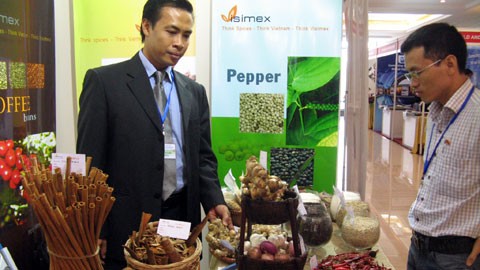(VOVworld) – In recent years, the Middle East and North African markets have emerged as potential destinations for Vietnamese exporters. Although two-way trade turnover has increased remarkably, the rise isn’t on par with the advantages of each side. How to maximize the available strengths for mutual development tops the concerns of both Vietnamese policy makers, managers, and entrepreneurs.
The Middle East and North Africa are home to more than 520 million people. Many countries in the region have great potential in economic development, abundant foreign currency reserves, and diverse needs of goods which match Vietnam’s export structure.
The recent good political relations have boosted bilateral development in economics, trade, and investment. Last year, two-way trade turnover reached 7.4 billion USD, up 900% compared to a decade ago, of which, Vietnam’s trade with some partners surpassed 1 billion USD per year.
However, participants at a recent seminar held by the Ministry of Trade and Industry acknowledged that geographical distance, unmatched demand and supply, and inefficient promotion programs are the main reasons behind the so far disappointing results. In addition, there remain many shortcomings in enterprises themselves and the government. They include inadequate market information, less confidence in success capacity, and adversity to risk leading to less investment cooperation opportunities. Many fields haven’t attracted the involvement of major enterprises. For instance, though Vietnam is the world’s second largest rice exporter, Vietnamese rice hasn’t been available in the Middle East market and only account for two thirds of the African market share. Pham Thi Ha Anh, Director of Binh Minh Food Company, a business experienced in exporting to this region, shares her company's experiences:
“To be able to penetrate these markets, businesses should understand them and identify targets and develop strategies. It’s necessary to learn the customers’ demands to see how far the companies can meet them. The markets are of great potential because they are large but the most important thing is to look for the right clients.”
 The most important thing for Vietnamese businesses is to look for the right clients, although Middle East and North Africa are large markets (Photo: VOV)
The most important thing for Vietnamese businesses is to look for the right clients, although Middle East and North Africa are large markets (Photo: VOV)
In the current global economic recession, shifting to the Middle East and North African markets is a good choice for Vietnamese exporters. To help domestic enterprises, state agencies have organized many promotional programs, conducted market surveys, set up distribution networks, opened representative offices, and regularly update the host countries’ political situations to avoid possible risks. Vu Hai Bang, Director of the African and West Asian Affairs Department of the Foreign Ministry, says:
“We have proposed to the government a plan to disseminate the legal documents and regulations of Middle East and African countries for enterprises. We have also recommended the issuing of a more open financial mechanism to facilitate conditions for small and medium sized enterprises to participate in these potential markets. We should find a way to improve our competitiveness there.”
Removing barriers, and difficulties and searching for more efficient ways of cooperation were the top concerns of a just concluded economic cooperation forum in Hanoi between Vietnam and Middle Eastern and North African nations. Deputy Foreign Minister Nguyen Phuong Nga says:
“We need to modify our legal frameworks so that they can be applied to all partners in the regions. I believe that the forum has helped find solutions removing some of the obstacles, creating better conditions for enterprises from both sides to access each other’s markets and do their investment and business in the easiest way.”
This year, two-way trade between Vietnam and the Middle East and North African regions is estimated to continue to rise thanks to the traditional good political relations and a well-designed cooperation roadmap for each ministry and sector.
Anh Huyen